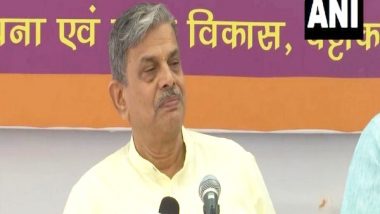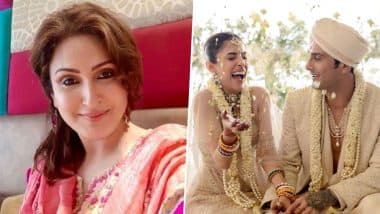New Delhi, March 14: Amid the ongoing debate over same-sex marriage in the country, Rashtriya Swayamsevak Sangh on Tuesday toed the line of the Centre stating that it considers marriage as 'Sanskar' in the Hindu life which is neither for enjoyment or contract but for social good.
This comes after the Centre, in its affidavit, had opposed the plea seeking legal recognition of same-sex marriage, saying that living together as partners by same-sex individuals, which is decriminalised now, is not comparable with the Indian family unit and they are clearly distinct classes which cannot be treated identically. Same-Sex Marriage: Centre Opposes Legal Recognition, Files Affidavit in Supreme Court.
Speaking to the reporters, RSS General Secretary Dattatreya Hosabale said that marriage can take place between two persons of opposite gender. Same-Sex Marriage: Centre in Supreme Court Opposes Plea Seeking Legal Recognition, Says It Can't Be Compared with Indian Family Unit.
"Marriages can take place between two opposite genders. In Hindu life marriage is 'Sanskar', it isn't for enjoyment, neither it is a contract. Living together is different, but what is called marriage is a 'sanskar' in Hindu life for thousands of years, which means that two individuals get married and live together not only for themselves, but for the family and for the social good. Marriage is neither for sexual enjoyment nor a contract," he said.
The Centre filed the affidavit countering the demand made by various petitioners seeking legal recognition of same-sex marriage. In the affidavit, Centre opposed the plea and said that pleas seeking legal recognition of same-sex ought to be dismissed as there exists no merit in these petitions.
Same-sex relationships and heterosexual relationships are clearly distinct classes which cannot be treated identically, the government said as its stand against the petition seeking legal recognition of LGBTQ marriage.
It is for the legislature to judge and enforce such societal morality and public acceptance based upon Indian ethos, the Centre said in its affidavit and added that western decisions sans any basis in Indian constitutional law jurisprudence, cannot be imported in this context.
In the affidavit, Centre apprised the Supreme Court that living together as partners by same-sex individuals, which is decriminalised now, is not comparable with the Indian family unit concept of a husband, a wife and children.
Centre submitted that the principles of legitimate state interest as an exception to life and liberty under Article 21 would apply to the present case.
Centre submitted that the statutory recognition of marriage as a union between a "man" and a "woman" is intrinsically linked to the recognition of the heterogeneous institution of marriage and the acceptance of the Indian society based upon its own cultural and societal values which are recognized by the competent legislature.
"There is an intelligible differentia (normative basis) which distinguishes those within the classification (heterosexual couples) from those left out (same-sex couples). This classification has a rational relation with the object sought to be achieved (ensuring social stability via recognition of marriages)," the government said.
Centre submitted before the Supreme Court that statutory recognition of marriage as a union between a "man" and a "woman" is intrinsically linked to the recognition of the heterogeneous institution of marriage and the acceptance of the Indian society based upon its own cultural and societal values which are recognized by the competent legislature.
In the latest development, the Supreme Court on Monday referred various petitions seeking legal recognition of same-sex marriage to the Constitution Bench.
A bench headed by Chief Justice of India DY Chandrachud listed the petitions seeking legal recognition of same-sex marriage to a five-judge bench constitution bench and said that the hearing will take place on April 18.
(This is an unedited and auto-generated story from Syndicated News feed, LatestLY Staff may not have modified or edited the content body)













 Quickly
Quickly




















